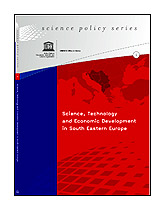
On Monday 13 March, Koïchiro Matsuura, the Director-General of UNESCO, opened the first meeting of the Committee reviewing UNESCO's science programs with an important address.
Here are some excerpts:
When plans were being laid for the foundation of the Organization towards the end of the Second World War, education was the main theme; the S for “scientific” was added only in November 1945 by the preparatory commission that met in London to create UNESCO as we know it today. The change was made mainly in response to the advocacy of many scientists’ groups, particularly in the United Kingdom. With the appointment of Julian Huxley as UNESCO’s first Director-General, the place of science and technology was strengthened, given that he was not only a distinguished scientist but also a great popularizer of science.
Since then, the action of the Organization in the natural sciences and the social and human sciences has developed in a rich variety of ways, always in keeping with its constitutional purpose “of advancing, through the educational and scientific and cultural relations of the peoples of the world, the objectives of international peace and the common welfare of mankind for which the United Nations was established and which its Charter proclaims”.
Needless to say, we must stress the relevance of this purpose for our future action. This relevance endures despite – and because of – the great changes that have taken place over recent decades during which the international community has had to tackle many major, inter-related challenges. To effectively address the complexity of these challenges, the evidenced-based contributions of a wide range of scientific disciplines are required. Four main areas of understanding must be enhanced:First, we must gain a better understanding of the impact of human activity, which has often had disastrous consequences for the sustainability of our natural environment in many parts of the world.All these issues must be tackled together, taking into consideration the clear trends relating to the growing gap between a relatively small number of industrialized countries, which account for more then 80 per cent of scientific research in all fields, and the rest of the world. A related issue is the phenomenon of brain drain, which continues to be a major problem despite some recent progress in a few countries to ensure new opportunities for their graduates of higher scientific education.
Second, we need to better appreciate the key role that science and technology play in development, in the struggle against poverty and in ensuring human security for the most vulnerable populations.
Third, we need a deeper understanding of the various social transformations which characterize our contemporary world, particularly in the context of accelerating globalization, which is also having an important impact in the so-called “politics of knowledge”. After all, many countries tend to finance scientific and technological research in those fields that can strengthen their competitiveness in the global arena.
Fourth, we must better understand the impact of scientific and technological progress itself on societies, including the way in which major developments are giving rise to more and more important ethical questions, for example (but not only) in the field of bioethics.



